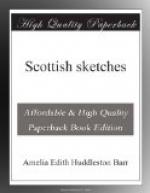Helen and Colin listened in glowing silence, Helen showing her sympathy by her flushing cheeks and wet eyes, and Colin by the impatient way in which he struck down with his stick the thistles by the path side, as if they were the demons of sin and ignorance and dirt Selwyn was warring against. But after three weeks of this intercourse Crawford became sensible of some change in the atmosphere of his home. When Selwyn first arrived, and Crawford learned that he was a clergyman in orders, he had, out of respect to the office, delegated to him the conduct of family worship. Gradually Selwyn had begun to illustrate the gospel text with short, earnest remarks, which were a revelation of Bible truth to the thoughtful men and women who heard them.
The laird’s “exercises” had often been slipped away from, excuses had been frequent, absentees usual; but they came to listen to Selwyn with an eagerness which irritated him. In our day, the gospel of Christ has brought forth its last beautiful blossom—the gospel of humanity. Free schools, free Bibles, Tract and City Missions, Hospitals and Clothing Societies, loving helps of all kinds are a part of every church organization. But in the time of which I am writing they were unknown in country parishes, they struggled even in great cities for a feeble life.
The laird and his servants heard some startling truths, and the laird began to rebel against them. A religion of intellectual faith, and which had certain well-recognized claims on his pocket, he was willing to support, and to defend, if need were; but he considered one which made him on every hand his brother’s keeper a dangerously democratic theology.
“I’ll hae no socialism in my religion, any more than I’ll hae it in my politics, Colin,” he said angrily. “And if yon Mr. Selwyn belongs to what they call the Church o’ England, I’m mair set up than ever wi’ the Kirk o’ Scotland! God bless her!”
They were sitting in the room sacred to business and to the memory of the late Laird Archibald. Colin was accustomed to receive his father’s opinions in silence, and he made no answer to this remark. This time, however, the laird was not satisfied with the presumed assent of silence; he asked sharply, “What say ye to that, son Colin?”
“I say God bless the Kirk of Scotland, father, and I say it the more heartily because I would like to have a place among those who serve her.”
“What are ye saying now?”
“That I should like to be a minister. I suppose you have no objections.”
“I hae vera great objections. I’ll no hear tell o’ such a thing. Ministers canna mak money, and they canna save it. If you should mak it, that would be an offence to your congregation; if ye should save it, they would say ye ought to hae gien it to the poor. There will be nae Dominie Crawford o’ my kin, Colin. Will naething but looking down on the warld from a pulpit sarve you?”




